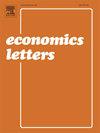From code to creativity: The impact of legal origins on innovation of private enterprises
IF 2.1
4区 经济学
Q2 ECONOMICS
引用次数: 0
Abstract
This study explores whether legal origins influence the innovation investments of private enterprises. We hypothesize that enterprises in civil law countries, where legal frameworks are codified and regulations are prescriptive, are more likely to invest in new product/service innovation due to the predictability and stability of their legal environments. Conversely, enterprises in common law countries, with their flexible and adaptive legal systems, are expected to prioritize process innovation, driven by the need to optimize operations and navigate regulatory changes more easily. Using data from the World Bank Enterprise Surveys covering private enterprises in 113 countries between 2010 and 2024, we find strong evidence supporting these hypotheses. Enterprises in civil law countries show a higher propensity for product/service innovation, while those in common law countries focus more on process innovation. These findings highlight the importance of legal and institutional frameworks in shaping innovation strategies, with several important implications.
从法规到创新:法律渊源对民营企业创新的影响
本研究探讨法律渊源是否会影响民营企业的创新投资。我们假设,大陆法系国家的企业,由于其法律环境的可预测性和稳定性,更有可能投资于新产品/服务创新,这些国家的法律框架是成文的,法规是规范性的。相反,普通法国家的企业拥有灵活和适应性强的法律体系,在优化运营和更容易驾驭监管变化的需求的推动下,预计将优先考虑流程创新。利用世界银行2010年至2024年间涵盖113个国家私营企业的企业调查数据,我们发现了支持这些假设的有力证据。大陆法系国家的企业表现出更高的产品/服务创新倾向,而英美法系国家的企业则更注重流程创新。这些发现突出了法律和制度框架在制定创新战略方面的重要性,并具有若干重要意义。
本文章由计算机程序翻译,如有差异,请以英文原文为准。
求助全文
约1分钟内获得全文
求助全文
来源期刊

Economics Letters
ECONOMICS-
CiteScore
3.20
自引率
5.00%
发文量
348
审稿时长
30 days
期刊介绍:
Many economists today are concerned by the proliferation of journals and the concomitant labyrinth of research to be conquered in order to reach the specific information they require. To combat this tendency, Economics Letters has been conceived and designed outside the realm of the traditional economics journal. As a Letters Journal, it consists of concise communications (letters) that provide a means of rapid and efficient dissemination of new results, models and methods in all fields of economic research.
 求助内容:
求助内容: 应助结果提醒方式:
应助结果提醒方式:


